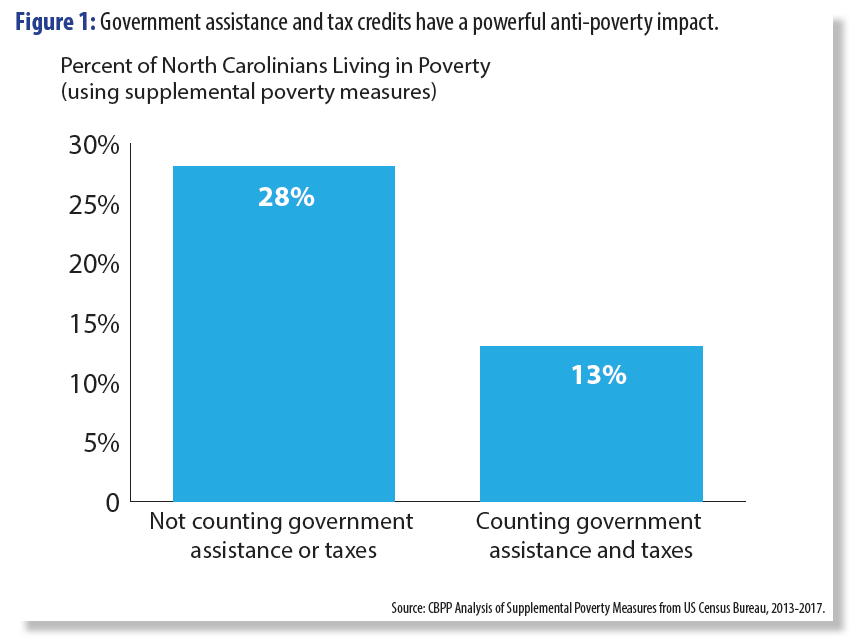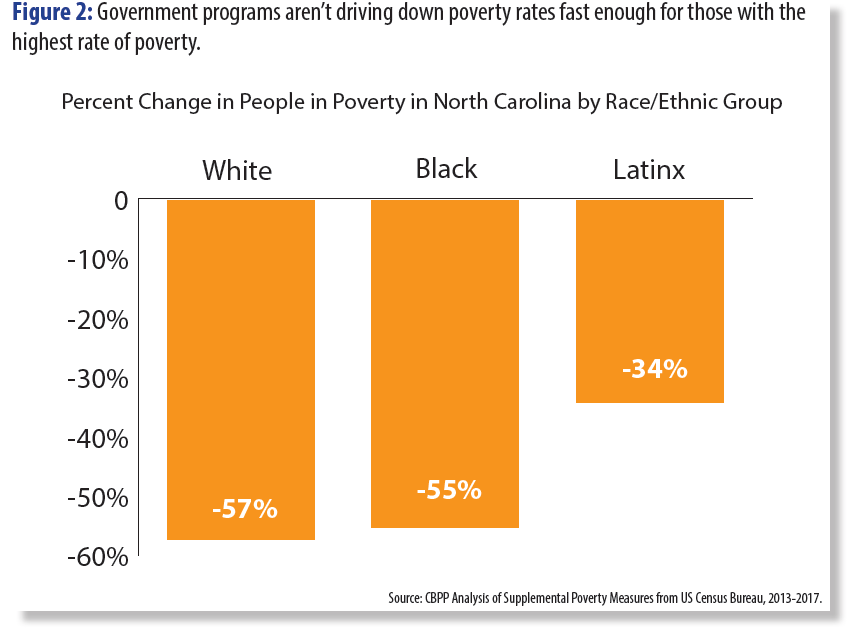Evidence shows that programs that provide food and housing assistance and tax credits do help North Carolinians move out of poverty.
The COVID-19 downturn has meant that more families across North Carolina are experiencing hardship, even as the federal and state response has shown the power of quickly mobilizing to ensure that people have what they need in times of crisis.
Time will tell whether the experience of hardship from the pandemic will extend over time and continue to affect the economy more broadly. Certainly, the response of policymakers will determine the depth and breadth of lasting effects from today’s challenges on families as they work to make ends meet.
The evidence is clear that the current patchwork of public programs and systems meant to fight poverty and address hardship is making a difference. With improvements, an infrastructure of coordinated, efficient, and equitable systems could make even greater progress in the work to improve the standard of living and to provide the financial security that are prerequisites for a healthy economy.
This BTC Brief highlights unique data analysis from the Center on Budget & Policy Priorities that estimates the effects of anti-poverty programs in moving people out of poverty and identifies some areas where policy choices could further maximize the benefits of these programs to families and the economy.
NC poverty is cut in half through government programs
In estimates of the average effect of programs like SNAP (Supplemental Nutrition Assistance Program), tax credits, and TANF (Temporary Assistance for Needy Families) from 2013-2017, researchers at the Center on Budget & Policy Priorities found that 1.5 million North Carolinians were supported in their movement out of poverty by government assistance. Nearly 300,000 North Carolinians, including 130,000 children, were lifted out of poverty by the SNAP program alone.1

The result is that the state’s poverty rate overall falls from 28 percent to 13 percent after taking government programs into account (See Figure 1).
The power of these anti-poverty programs, however, is not equally felt. The latest data show that white North Carolinians are more likely to experience a reduction in poverty than Black or Latinx North Carolinians (See Figure 2). This inequitable outcome is the result of policy choices within programs that block people of color from securing the same benefits as white people and block progress on bringing down overall poverty rates in the state. The higher poverty rates experienced by Black and Latinx North Carolinians should drive policymakers to ensure that policies and programs are creating the greatest declines for these groups.

North Carolina can make greater progress in reducing poverty
Policy choices matter when it comes to the effectiveness of food assistance, housing vouchers, cash assistance, and tax credits in making sure that people have the basics they need. North Carolina can look at broad areas of policy design in each of these programs to ensure that the state is maximizing its tools in the fight against poverty.
Doing so must begin with an assessment of the racial-equity impact of policy choices within each of these programs to ensure that the state’s systems aren’t harming the opportunity of North Carolinians based on who they are or where they live.
- Family cap policies in TANF limit the ability of families to receive adequate income support for each child in their family. Researchers have found that receipt of cash assistance has no impact on child-bearing decisions.2
- Drug felony bans in TANF and SNAP reinforce the disproportionate enforcement activities in communities of color. Researchers have found that income and food assistance is essential to the stability and successful re-entry of people back into communities.3
In the coming year, it is crucial that NC policymakers focus on strengthening the state’s anti-poverty programs.
Remove barriers that disproportionately hurt North Carolinians of color
- Prohibition against time-limit waivers for ABAWD: The North Carolina legislature has banned the state from seeking special permission from the USDA, which results in adults with no children or disabilities being denied food assistance if they cannot find employment or an approved vocational training program for 20 hours a week, regardless of the economic conditions in their community.4
- SNAP and TANF felony ban: North Carolina is one of a dwindling number of states that restricts access to both cash and food assistance for people who have been convicted of specific drug-related felonies. Preventing people from accessing the support they need immediately after serving their sentences as they transition to life after incarceration does not prevent crime or reduce recidivism, and in fact, may increase re-arrest rates.5
- The TANF family cap denies a benefit increase to families who have an additional child while receiving TANF. The family cap provision aims to control reproductive choices and makes the racist assumption that women would choose to have a child to increase TANF benefits by as little as $26 a month. Notably, the policy has no impact on birth rates.6
Support systemic solutions to poverty that assist North Carolinians on the path to economic security
- Tax credits for working families: Reestablishing a generous and fully refundable state-level Earned Income Tax Credit and adequately investing in IRS Volunteer Income Tax Assistance sites around the state would ensure that all eligible families are claiming the family tax credits, which are known to improve health and well-being outcomes for both parents and children and to increase the future economic outcomes of children in families that claim the credit.7
- Investment in early childhood education.
Footnotes
- Matt Saenz,” Research Note: Economic Security Programs Significantly Reduce Poverty in Every State” (CBPP, August 10, 2021) see Appendix table 7.
- https://www.cbpp.org/research/family-income-support/temporary-assistance-for-needy-families
- https://www.clasp.org/publications/report/brief/no-more-double-punishments#:~:text=The%20act%20imposes%20a%20lifetime,remove%20or%20modify%20the%20ban.
- Brian Kennedy II, “Time-limit waivers keep food on the table in tough times” (North Carolina Budget & Tax Center, April 2019) https://www.ncjustice.org/wp-content/uploads/2019/04/BTC-BRIEF-abawd-time-limit-april-2019.pdf.
- Ed Bolen, “Restore SNAP for People with Drug-Related Convictions”(Center for Budget and Policy Priorities, May 17, 2021) https://www.cbpp.org/blog/restore-snap-for-people-with-drug-related-convictions.
- North Carolina TANF benefit application information, accessed November 10, 2021 at: https://www.benefitsapplication.com/program_info/NC/North%20Carolina%20Work%20First%20Cash%20Assistance; “States Should Repeal Racist Policies Denying Benefits to Children Born to TANF Families (CBPP, APRIL 30, 2019) https://www.cbpp.org/blog/states-should-repeal-racist-policies-denying-benefits-to-children-born-to-tanf-families
- Heba Atwa, “State EITC Could Improve the Health of North Carolinians” (North Carolina Budget & Tax Center, November 13, 2019) https://www.ncjustice.org/publications/state-eitc-could-improve-the-health-of-north-carolinians/
 Justice Circle
Justice Circle